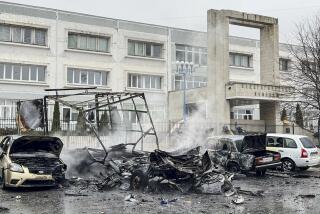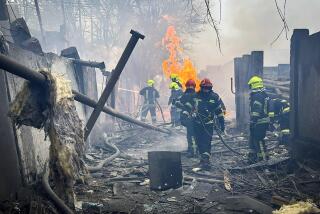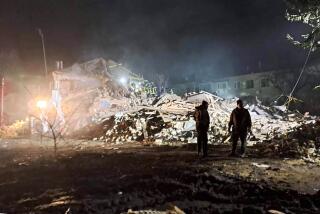42 killed in fighting in southern Ukraine
Armed clashes left scores of people dead in Ukraine on Friday, as President Obama and German Chancellor Angela Merkel vowed to impose stiffer economic sanctions on Russia if it disrupts Ukraine’s upcoming election.
Officials said 42 people had been killed in battles between government supporters and Russia-backed separatists in the southern city of Odessa, marking the worst day of bloodshed in the months-long crisis.
The Black Sea port city, with a predominantly Russian-speaking population, is geographically and culturally closer to the pro-Europe western areas of Ukraine and until now had largely escaped the separatist violence.
Thirty people died when fire and smoke engulfed the central trade union building, where pro-Russia militants were said to be shooting from upper floors at pro-unity demonstrators in the streets, police said. Eight others died when they jumped from the burning building, authorities said.
The deadly blaze followed a day of street battles in the historic port, which began when rival groups of protesters converged amid volleys of Molotov cocktails, stun grenades and cobblestones, according to news reports. That clash left four dead and at least 15 wounded, police said.
In eastern Ukraine, the focus of the deepening crisis, pro-Russia militants shot down two Ukrainian Mi-24 military helicopters that were trying to retake the city of Slovyansk, one of more than a dozen held by the separatists.
The fledgling government in Kiev has launched an offensive in the Slovyansk area with armored columns and aircraft, but so far its troops have struggled to gain ground. Ukrainian officials said two soldiers were killed and seven were injured, but most of the city of 130,000 apparently remained in separatist hands.
“We are holding on to our positions and are not planning a retreat,” the self-proclaimed mayor of Slovyansk, Vyacheslav Ponomaryov, said in a telephone interview. He said six military inspectors from the Organization for Security and Cooperation in Europe and their interpreter, who were abducted by the separatists last week, “are well and taken care of in a safe place in town.”
The day’s death toll was the highest in more than two months of turmoil in eastern and southern Ukraine.
Ukraine’s acting president, Oleksandr Turchynov, blamed Moscow for fueling the growing violence and accused pro-Russia forces of hiding behind civilians.
“Our power structures are engaged in a fight with mercenaries from a foreign state and criminals who take hostages, kill and torture people,” Turchynov said in a televised address.
Russian President Vladimir Putin has called on the interim government in Kiev, the Ukrainian capital, to withdraw its troops from the east, which would essentially cede control to the separatists. Russia has deployed tens of thousands of troops near the countries’ shared border and has claimed the right to intervene if necessary to protect ethnic Russians in Ukraine.
Putin’s spokesman, Dmitry Peskov, told the Itar-Tass news agency Friday that Russia “is making efforts to de-escalate and resolve the conflict,” and he blamed Kiev for launching a “punitive operation” in Slovyansk that hurt chances for peace.
In Washington, Obama and Merkel downplayed their differences and offered a united front against Russia at a joint news conference in the Rose Garden. They threatened broad sanctions against Russia’s major economic sectors if Moscow does not rein in the militants who have destabilized eastern Ukraine and threaten to disrupt the country’s presidential election this month.
“The next step is going to be a broader-based sectoral sanctions regime,” Obama said. “If in fact we see the disruptions and the destabilization continuing so severely that it impedes elections on May 25, we will not have a choice but to move forward with additional, more severe sanctions.”
In previous remarks, Obama warned of tougher penalties if Putin ordered his troops to invade Ukraine. But U.S. and European travel bans and asset freezes on a dozen of Putin’s political allies and business associates, and on several banks and companies, have shown no sign of persuading the Russian leader to pull back his troops and move to a negotiated solution.
Friday’s statements by Obama and Merkel appeared to adjust the trigger point for more aggressive action, with Merkel calling the Ukrainian presidential election “crucial.” The recalibration reflects a growing view in the West that the vote presents the best, if still long-shot, hope for a peaceful resolution of the crisis.
Obama vented frustration with Putin’s claim that Russia is not supporting the separatists. “Generally, local protesters don’t possess that capacity of surface-to-air missiles or whatever weapons were used to shoot down helicopters,” he said.
Merkel, who has had a close relationship with Putin and has acted as something of a liaison to him throughout the crisis, dodged reporters’ questions about his intentions.
Germany, the largest economy in Europe, is viewed as a linchpin in the West’s attempts to craft a unified response to the conflict. Its economy is closely linked to Russia, especially for energy supplies, and major German businesses and industries have lobbied against penalties that might damage their bottom lines.
Like much of Europe, the Germans have been far slower than Washington to consider or impose sanctions on Russia, even when Moscow annexed Ukraine’s Crimean peninsula in March after protests caused then-Ukrainian President Viktor Yanukovich, a Moscow ally, to flee the country.
On Friday, Obama sought to demonstrate that he understood the German concerns, noting that Russia exported oil and gas to Europe even at the height of the Cold War. “So the idea that you’re going to turn off the tap on all Russian oil or natural gas exports, I think, is unrealistic,” he said.
Although his relationship with Merkel was strained by revelations last year that the National Security Agency had been eavesdropping on her cellphone, Obama described the German leader as “one of my closest friends on the world stage.”
Earlier Friday, reporters and TV crews from BuzzFeed, Sky News and CBS News were detained at a roadblock outside Slovyansk, where they were blindfolded and questioned. CBS reported that one member of its crew was beaten. The U.S. and British news teams were held for about three hours before being released, the news organizations reported.
Hennessey reported from Washington, Loiko from Moscow and Williams from Los Angeles.
More to Read
Start your day right
Sign up for Essential California for news, features and recommendations from the L.A. Times and beyond in your inbox six days a week.
You may occasionally receive promotional content from the Los Angeles Times.








